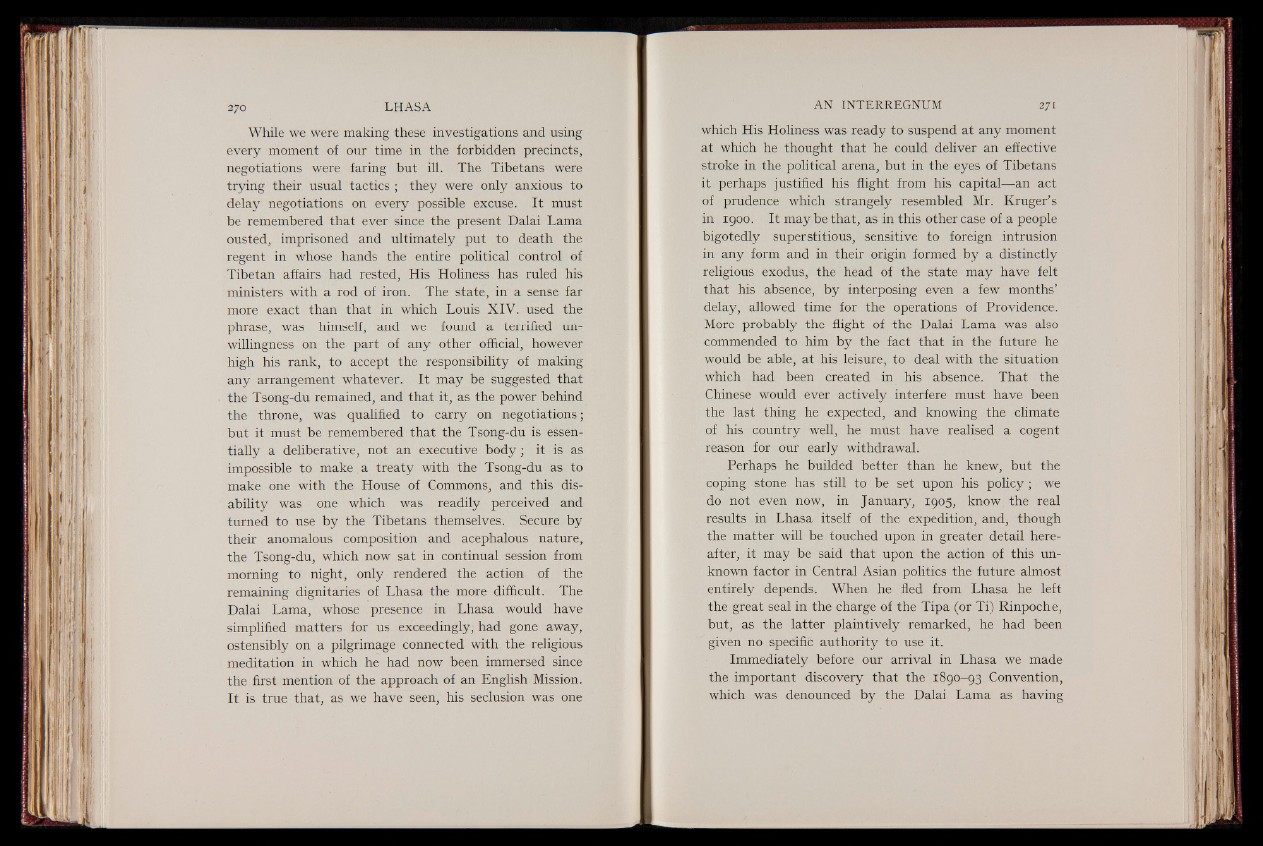
While we were making these investigations and using
every moment of our time in the forbidden precincts,
negotiations were faring but ill. The Tibetans were
trying their usual tactics ; they were only anxious to
delay negotiations on every possible excuse. It must
be remembered that ever since the present Dalai Lama
ousted, imprisoned and ultimately put to death the
regent in whose hands the entire political control of
Tibetan affairs had rested, His Holiness has ruled his
ministers with a rod of iron. The state, in a sense far
more exact than that in which Louis XIV. used the
phrase, was himself, and we found a terrified unwillingness
on the part of any other official, however
high his rank, to accept the responsibility of making
any arrangement whatever. It may be suggested that
the Tsong-du remained, and that it, as the power behind
the throne, was qualified to carry on negotiations;
but it must be remembered that the Tsong-du is essentially
a deliberative, not an executive body ; it is as
impossible to make a treaty with the Tsong-du as to
make one with the House of Commons, and this disability
was one which was readily perceived and
turned to use by the Tibetans themselves. Secure by
their anomalous composition and acephalous nature,
the Tsong-du, which now sat in continual session from
morning to night, only rendered the action of the
remaining dignitaries of Lhasa the more difficult. The
Dalai Lama, whose presence in Lhasa would have
simplified matters for us exceedingly, had gone away,
ostensibly on a pilgrimage connected with the religious
meditation in which he had now been immersed since
the first mention of the approach of an English Mission.
It is true that, as we have seen, his seclusion was one
which His Holiness was ready to suspend at any moment
at which he thought that he could deliver an effective
stroke in the political arena, but in the eyes of Tibetans
it perhaps justified his flight from his capital— an act
of prudence which strangely resembled Mr. Kruger’s
in 1900. It may be that, as in this other case of a people
bigotedly superstitious, sensitive to foreign intrusion
in any form and in their origin formed by a distinctly
religious exodus, the head of the state may have felt
that his absence, by interposing even a few months’
delay, allowed time for the operations of Providence.
More probably the flight of the Dalai Lama was also
commended to him by the fact that in the future he
would be able, at his leisure, to deal with the situation
which had been created in his absence. That the
Chinese would ever actively interfere must have been
the last thing he expected, and knowing the climate
of his country well, he must have realised a cogent
reason for our early withdrawal.
Perhaps he builded better than he knew, but the
coping stone has still to be set upon his policy ; we
do not even now, in January, 1905, know the real
results in Lhasa itself of the expedition, and, though
the matter will be touched upon in greater detail hereafter,
it may be said that upon the action of this unknown
factor in Central Asian politics the future almost
entirely depends. When he fled from Lhasa he left
the great seal in the charge of the Tipa (or Ti) Rinpoche,
but, as the latter plaintively remarked, he had been
given no specific authority to use it.
Immediately before our arrival in Lhasa we made
the important discovery that the 1890-93 Convention,
which was denounced by the Dalai Lama as having